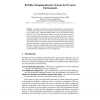1104 search results - page 145 / 221 » Understanding Human Behavior Using a Language Modeling Appro... |
146
click to vote
KCAP
2011
ACM
14 years 5 months ago
2011
ACM
Some supervised-learning algorithms can make effective use of domain knowledge in addition to the input-output pairs commonly used in machine learning. However, formulating this a...
112
Voted
IROS
2009
IEEE
15 years 8 months ago
2009
IEEE
— Fluid bipedal locomotion remains a significant challenge for humanoid robotics. Recent bio-inspired approaches have made significant progress by using small numbers of tightl...
115
click to vote
COGSCI
2010
15 years 21 days ago
2010
It is frequently claimed that the human mind is organized in a modular fashion, a hypothesis linked historically, though not inevitably, to the claim that many aspects of the huma...
139
click to vote
DSVIS
2008
Springer
15 years 3 months ago
2008
Springer
The design of interactive software that populates an ambient space is a complex and ad-hoc process with traditional software development approaches. In an ambient space, important ...
112
click to vote
AAMAS
2004
Springer
15 years 2 months ago
2004
Springer
Our goal in this paper is to introduce and motivate a methodology, called Tropos,1 for building agent oriented software systems. Tropos is based on two key ideas. First, the notion...


